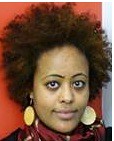RISING voices: Beliyou Haile, associate research fellow (IFPRI) and global monitoring and evaluation coordinator
In this interview, Beliyou Haile introduces herself and her work with Africa RISING. It is one of a series of portraits of key people in the program.

Tell us about your background
My background is in economics, focused on international development and labor economics. Before I joined the International Food Policy Research Institute (IFPRI) as associate research fellow, I was a Monitoring and Evaluation (M&E) specialist at a consultancy firm based in Maryland. I was carrying out evaluations of US healthcare programs. I have been involved in Africa RISING since January 2013 as global M&E coordinator for all three mega sites.
What do you do in your current position?
I like my work because I get to travel; it can be taxing but then I get to meet new people, face new challenges etc. In terms of my role, the first couple of months it was mostly about attending meetings and getting to know the program and projects better, visiting sites, understanding research activities and meeting researchers, drafting the survey tool for Malawi, customizing it for Tanzania and Ghana and a lot of communication with local M&E coordinators to make sure that tasks are being completed on time and well. It also entailed quite some back and forth with survey firms for our baseline surveys.
What are your plans for Africa RISING?
Once we have the baseline surveys done the focus will shift to the analysis, report-writing and communicating the results to the research teams. Then we’ll be making sense of the data we have been collecting for the program. As part of the requirements for my tenure at IFPRI I need to produce research papers. I was supposed to do that in the last year but it was impossible. However, with the new staff we hired I am hopeful I can invest some time on doing economic research. One topic I have in mind is to revise my dissertation chapter about HIV/AIDS for Ethiopia; 2014 for me should be more output-oriented: implementing surveys, analyzing data, producing reports, writing research papers, communicating them etc. We also need to start thinking about the design of end line surveys. I’ve heard that in Malawi the beneficiaries have doubled since we designed the survey so I need to see if we can start learning more about this next wave of beneficiaries in Malawi etc.
Another major aspect is around the project monitoring and mapping tool. We invested a lot of time on it lately. This work has to be followed through to simplify researchers’ work. Based on the feedback we received at the M&E meeting in Addis Ababa last November, we are updating the tool and hopefully we will be able to have a new version of the PMT to go live by end of March. Then we’ll have to train representatives of each research theme and local M&E coordinators to make it easier for them to track and monitor project activities, upload data or learn more about project activities and data sets from the different mega sites… This tool should become a venue to easily access data and learn.
What are the biggest Africa RISING challenges and how do we deal with them?
What I found challenging in the past year – for the IFPRI M&E team – was to meet the expectations set at the beginning of the program i.e. delivering quite many things in a short period of time. Some of these expectations were not realistic because we did not have enough staff or not skilled enough staff to deliver on these promises; so we hired more people, but finding the right person has been a challenge and it took a long time. I don’t think everyone understands how difficult it is to successfully implement the kind of surveys we try to implement, because of the large sample sizes, the complexity of the survey etc. We may not have done the baseline survey as some expected but that is also because we wanted to get the right infrastructure (i.e. with competent survey firm/survey managers in place). We’ve been working 24/7 and beyond but it is not showing at least thus far. I’m very hopeful however that the surveys go as planned for Mali, Ghana and Ethiopia. Same with the project monitoring and mapping tool.
I have been working all the time to make sure that we deliver as promised and on time. I have attempted to create a better communication/coordination between the M&E team in DC and local M&E coordinators as well as the research teams in each mega-site. As an individual you just try to put all efforts into the work and spend more time on critical planning. Then at meetings you try to explain what is going on and the merit of what you’re trying to achieve – hopefully with the result that M&E and research teams work more closely together and the evidence from the various M&E activities will help inform project managers, USAID, and other stakeholders.
Anything else you want to share?
Working on Africa RISING has been quite a ride for me. It’s an interesting and ambitious program. I’m still learning about it; every time I read the program framework I understand it better. Hopefully over time and with the experience I acquired over the last year, things will become clearer and less painful in terms of the implications on my work-life balance. But we will see.




